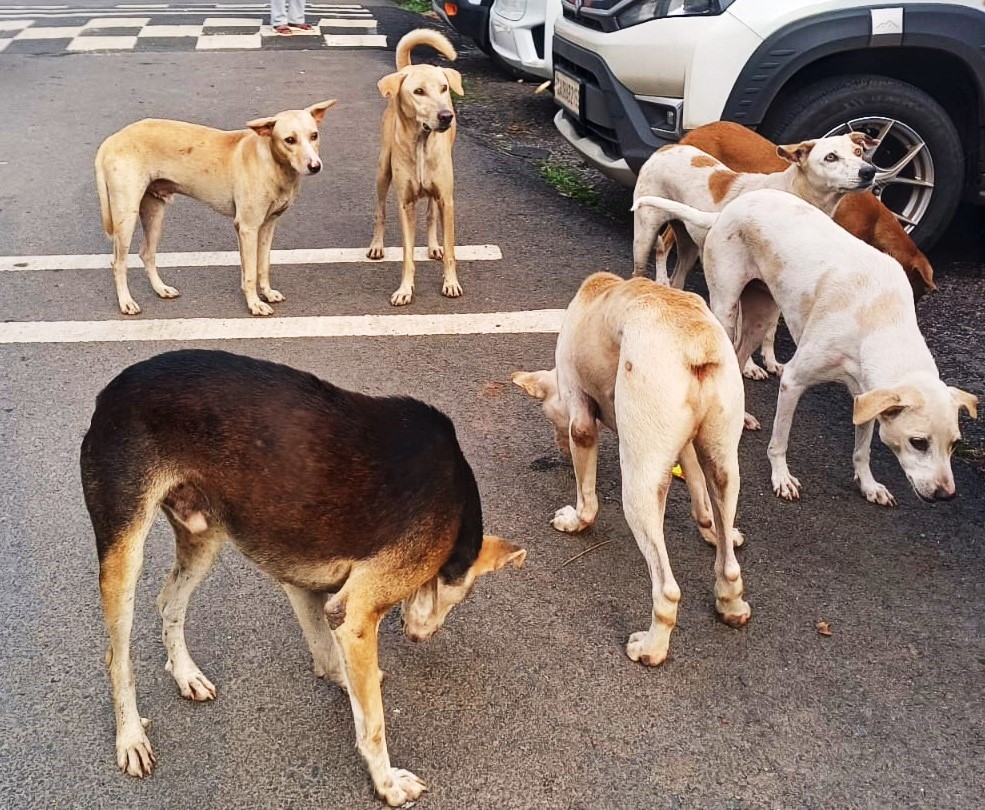Stakeholders say MMC has failed to implement ABC programme effectively

Stray dogs menace in the commercial capital.
MARGAO
The Supreme Court’s recent directive to the Delhi government to shift stray dogs to dedicated shelters within eight weeks has reignited the nationwide debate on the growing stray dog menace.
The court’s order brings into sharp focus a critical and often contentious question: Who bears the responsibility for the surge in stray dog populations — the government, local municipal bodies, or the NGOs involved in implementing the Animal Birth Control (ABC) programme?
Welcome to Goa’s commercial capital, Margao, where apathy and bureaucratic inertia have virtually crippled the ABC programme. Despite clear High Court guidelines on how civic bodies should manage the sterilization and control of stray dogs, stakeholders say the Margao Municipal Council (MMC) has failed to implement the programme effectively.
Consider this: The gravity of the situation is underscored by a glaring disparity: while the number of stray dogs in Margao has risen steadily over the years, the infrastructure to house and manage them has remained stagnant. The city’s only dog shelter, built over 15 years ago, still operates with just 20 cages. Promises to shift the shelter to a more spacious facility with at least 100 cages have not materialized.
Initially, in response to the Supreme Court’s ban on the killing of stray dogs in the late 1990s, the MMC collaborated with an animal welfare NGO to launch sterilization drives. This initiative had raised hopes of curbing the stray dog population in the city. However, due to the MMC’s failure to provide adequate financial and logistical support, the NGO eventually withdrew from the programme.
In 2009–10, a new NGO, which is currently manning the ABC programme, was brought on board with assurances of funding and resources. The organization constructed a 20-cage shelter on a 280-square-metre plot at Sonsodo, on an understanding that it was a temporary measure until a larger, permanent facility was developed. Yet, over a decade and a half later, no such expansion has occurred.
The NGO continues to struggle with minimal support, rendering the ABC programme ineffective. Despite sustained efforts by animal lovers and notwithstanding commitments by the civic body, Margao remains ill-equipped to address the issue. The shelter operates under the same constraints it faced 15 years ago, even as the number of stray dogs continues to climb.
MOU lapsed on
December 31, 2020 (subhead)
Strange it may seem, but true that while the MoU with the current NGO expired on December 31, 2020, the Margao Civic body showed no haste to ink a fresh Memorandum of Understanding with the NGO. It’s another matter that the animal lovers manning the show continued the ABC programme, gave shelter and treatment of injured dogs out of sheer love for the animals.
As the spotlight returns to the issue of stray dog management nationwide, Margao serves as a stark reminder of what happens when official promises are not backed by action.